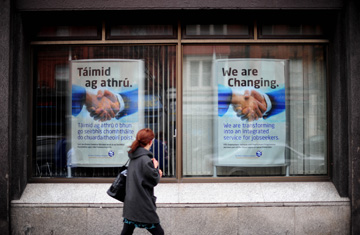
A pedestrian passes a Training and Employment Authority office in Dublin on Feb. 28, 2012
(2 of 2)
Yet the immediate future at least doesn't appear to be too bright. The latest Irish Central Bank and European Commission economic forecasts say GDP will grow by just 0.5% in 2012, owing to slow export growth and weak consumer spending. For the time being, internal growth will be tough while the population is being squeezed by high levels of household debt.
"Clearly the last four or five years has been the unfortunately necessary consequence of the splurging of the previous decade or so ... What we saw was a big bubble followed by a big crash, and the Irish economy is only stabilizing from that crash now. The problem is that we're stabilizing at a much lower level of income," says Ronan Lyons, a Dublin-born economist based at Oxford University. He forecast the next five years would continue to be tough.
"The government has to cut spending and raise taxes ... every budget is going to be a tough budget, and that is going to weigh down on sentiment even though slowly but surely exports are going to start growing, there is going to be an upturn in the jobs market ... The recovery is going to be slow."
But, he points out, there are positives: the medium-term IMF forecasts predict that Ireland will return growth between 2% and 3% by 2014-15 and the Central Bank predicts 2.1% growth next year. "Unlike Greece, unlike Portugal, unlike Spain, the fundamental growth path is solid," Lyons says.
In this scenario the government's strategy of seeking inward investment will be key. Ireland has a proven track record of success in this area, ranking top of the IBM Global Location Trends report for foreign direct investment in 2011, with only Singapore creating more jobs per capita through foreign direct investment. Meanwhile the downturn has brought some advantages: "The crash has brought the cost level down significantly ... that's made Ireland an easier sell," Lyons notes.
But such cautious optimism may come to fruition too late for the thousands of young people like Philippa Barry who will continue to leave the country in the interim.
"A few of my friends have tried to stay in education to wait out the recession but now are emigrating to the U.K.," Barry says. "Other friends are trying to find a way out. One is in New York on a holiday. He'll probably come back to collect his clothes and leave."
